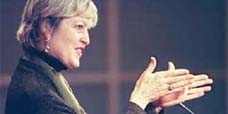2006.07.05: July 5, 2006: Headlines: National Service: Seattle Times: Christopher H. Sheppard writes: America should institute a national service requirement — a universal draft
Peace Corps Online:
Peace Corps News:
Library:
Peace Corps: National Service :
National Service:
2006.07.05: July 5, 2006: Headlines: National Service: Seattle Times: Christopher H. Sheppard writes: America should institute a national service requirement — a universal draft
Christopher H. Sheppard writes: America should institute a national service requirement — a universal draft

A national-service requirement would be an insurance policy, an added sanity check to help protect us from being led into unnecessary wars by incompetent leaders. Before an administration could initiate a preemptive war, the American public — in total — would be more likely to demand a burden of proof for the necessity of military action. When the lives of senators' and business leaders' children are at stake, along with the children of Wal-Mart employees, there is a much greater likelihood there will be adequate debate and hard questions asked before the trigger is pulled.
Christopher H. Sheppard writes: America should institute a national service requirement — a universal draft
An obligation to serve
By Christopher H. Sheppard
Special to The Times
IN the hands of competent elected officials who pursue enlightened and realistic foreign policy, the all-volunteer military is a win-win arrangement for all — the administration, Congress, the military and the American people.
But when incompetent leaders recklessly use the all-volunteer military in pursuit of flawed foreign policy goals, the system's defects begin to hemorrhage and bleed through. In November 2004, seven of my Marines were killed or wounded during the second battle of Fallujah in Iraq.
Those Marines typified the diversity of America itself — a Vietnamese immigrant, a truck driver from Michigan, a Guatemalan immigrant, a heavy-equipment operator from Illinois, a family man from Washington state, a Michigan State University student, and a baby-faced 20-year-old from Texas.
Aside from being proud Marines who bravely fought for their country, another commonality lies beneath the surface — none came from a wealthy background.
The overwhelming majority of the 220 Marines in my reserve company came from places not known for their mansions and country clubs — South Philadelphia; Flint, Mich.; Superior, Ariz.; Battle Creek, Mich.
While two wars rage, where are the children of America's wealthy, powerful and privileged in 2006? They are home, relaxing on plush leather couches, avidly watching "Laguna Beach" and "The Simple Life." They scarcely think about the war in Iraq and their less fortunate peers running combat patrols in Baghdad, Fallujah and Ramadi. Their parents rest well at night, knowing their children are safe and will inherit the best America has to offer.
Why would the sons and daughters of privilege volunteer to fight in an unpopular and apparently stalemated war in Iraq? There is no reason for them to do so — and they haven't. Their tour in Iraq or Afghanistan has been successfully outsourced to their working class countrymen.
An all-volunteer military, on the surface, appears to be a democratic method for filling our military's ranks. Patriotic, motivated recruits enlist and receive opportunities to better their lives though education and training. The result is a highly skilled, disciplined force of military professionals.
But the very market efficiency of the all-volunteer military unintentionally facilitates a moral rot in our nation's social fabric. Personal sacrifice is the catalyst of character and a prerequisite for good citizenship. The elites, who make and greatly influence our nation's policy decisions, often have no personal connection to our nation's wars. This disconnect, the lack of personal consequence for collective action, allows many to become blasé and apolitical about matters of the greatest national consequence.
America should institute a national service requirement — a universal draft. The requirement should not be exclusively military — not everyone is physically or mentally capable of military service — but almost all citizens can contribute to our country in some way. Young people could have the option of serving in the military, AmeriCorps or the Peace Corps, or helping the Border Patrol, working with homeland security or fighting forest fires. Young Americans, from every walk of life, both men and women, should be required to serve their country in some capacity.
A national-service requirement would be an insurance policy, an added sanity check to help protect us from being led into unnecessary wars by incompetent leaders. Before an administration could initiate a preemptive war, the American public — in total — would be more likely to demand a burden of proof for the necessity of military action. When the lives of senators' and business leaders' children are at stake, along with the children of Wal-Mart employees, there is a much greater likelihood there will be adequate debate and hard questions asked before the trigger is pulled.
A national-service draft would be expensive, possibly reduce the military's efficiency, and inconvenience some from pursuing their own self-interest. But would required national service be more expensive than spending hundreds of billions on unnecessary wars? Would the personal burden of required national service outweigh the collective wisdom, maturity and value of citizenship gained by America's youth from the experience?
The Greatest Generation readily shouldered the burden of required national service. With it, they defeated militant fascism, contained communism and went on to build modern America with the values and skills gained from the experience.
Is the current generation equal to the task? I think so.
Christopher H. Sheppard is a former Marine captain who served two tours of duty in Iraq as a combat engineer. He currently is finishing his master's degree in mass communication and lives in Marysville.
When this story was posted in July 2006, this was on the front page of PCOL:





Peace Corps Online The Independent News Forum serving Returned Peace Corps Volunteers
 | Changing the Face of Hunger
In his new book, Former Congressman Tony Hall (RPCV Thailand) says humanitarian aid is the most potent weapon the United States can deploy against terrorism. An evangelical Christian, he is a big believer in faith-based organizations in the fight against hunger. Members of Congress have recently recommended that Hall be appointed special envoy to Sudan to focus on ending the genocide in Darfur. |
 | PC will not return to East Timor in 2006
Volunteers serving in East Timor have safely left the country as a result of the recent civil unrest and government instability. Latest: The Peace Corps has informed us that at this time, the Peace Corps has no plans to re-enter the country in 2006. The Peace Corps recently sent a letter offering eligible volunteers the opportunity to reinstate their service in another country. |
 | Chris Dodd considers run for the White House
Senator Chris Dodd plans to spend the next six to eight months raising money and reaching out to Democrats around the country to gauge his viability as a candidate. Just how far Dodd can go depends largely on his ability to reach Democrats looking for an alternative to Hillary Clinton. PCOL Comment: Dodd served as a Volunteer in the Dominican Republic and has been one of the strongest supporters of the Peace Corps in Congress. |
 | Vasquez testifies before Senate Committee
Director Vasquez testifies before the Senate Foreign Relations Committee on his nomination as the new Representative to the United Nations Agencies for Food and Agriculture replacing Tony Hall. He has been the third longest serving Peace Corps Director after Loret Ruppe Miller and Sargent Shriver. PCOL Comment: Read our thanks to Director Vasquez for his service to the Peace Corps. |
 | Interview with a Hit Man
RPCV John Perkins says that for many years he was an "economic hit man" in the world of international finance whose primary job was to convince less developed countries to accept multibillion dollar loans for infrastructure projects that left the recipient countries wallowing in debt and highly vulnerable to outside political and commercial interests. In this exclusive interview for "Peace Corps Online," Colombia RPCV Joanne Roll, author of Remember with Honor, talks to Perkins about his Peace Corps service, his relation with the NSA, "colonization" in Ecuador, the consequences of his work, why he decided to speak out, and what his hopes are for change. |
 | Peace Corps stonewalls on FOIA request
The Ashland Daily Tidings reports that Peace Corps has blocked their request for information on the Volkart case. "After the Tidings requested information pertaining to why Volkart was denied the position — on March 2 — the newspaper received a letter from the Peace Corps FOIA officer stating the requested information was protected under an exemption of the act." The Dayton Daily News had similar problems with FOIA requests for their award winning series on Volunteer Safety and Security. |
 | PCOL readership increases 100%
Monthly readership on "Peace Corps Online" has increased in the past twelve months to 350,000 visitors - over eleven thousand every day - a 100% increase since this time last year. Thanks again, RPCVs and Friends of the Peace Corps, for making PCOL your source of information for the Peace Corps community. And thanks for supporting the Peace Corps Library and History of the Peace Corps. Stay tuned, the best is yet to come. |
 | History of the Peace Corps
PCOL is proud to announce that Phase One of the "History of the Peace Corps" is now available online. This installment includes over 5,000 pages of primary source documents from the archives of the Peace Corps including every issue of "Peace Corps News," "Peace Corps Times," "Peace Corps Volunteer," "Action Update," and every annual report of the Peace Corps to Congress since 1961. "Ask Not" is an ongoing project. Read how you can help. |
 | RPCV admits to abuse while in Peace Corps
Timothy Ronald Obert has pleaded guilty to sexually abusing a minor in Costa Rica while serving there as a Peace Corps volunteer. "The Peace Corps has a zero tolerance policy for misconduct that violates the law or standards of conduct established by the Peace Corps," said Peace Corps Director Gaddi H. Vasquez. Could inadequate screening have been partly to blame? Mr. Obert's resume, which he had submitted to the Peace Corps in support of his application to become a Peace Corps Volunteer, showed that he had repeatedly sought and obtained positions working with underprivileged children. Read what RPCVs have to say about this case. |
 | Why blurring the lines puts PCVs in danger
When the National Call to Service legislation was amended to include Peace Corps in December of 2002, this country had not yet invaded Iraq and was not in prolonged military engagement in the Middle East, as it is now. Read the story of how one volunteer spent three years in captivity from 1976 to 1980 as the hostage of a insurrection group in Colombia in Joanne Marie Roll's op-ed on why this legislation may put soldier/PCVs in the same kind of danger. Latest: Read the ongoing dialog on the subject. |
Read the stories and leave your comments.

Some postings on Peace Corps Online are provided to the individual members of this group without permission of the copyright owner for the non-profit purposes of criticism, comment, education, scholarship, and research under the "Fair Use" provisions of U.S. Government copyright laws and they may not be distributed further without permission of the copyright owner. Peace Corps Online does not vouch for the accuracy of the content of the postings, which is the sole responsibility of the copyright holder.
Story Source: Seattle Times
This story has been posted in the following forums: : Headlines; National Service
PCOL33438
11
























